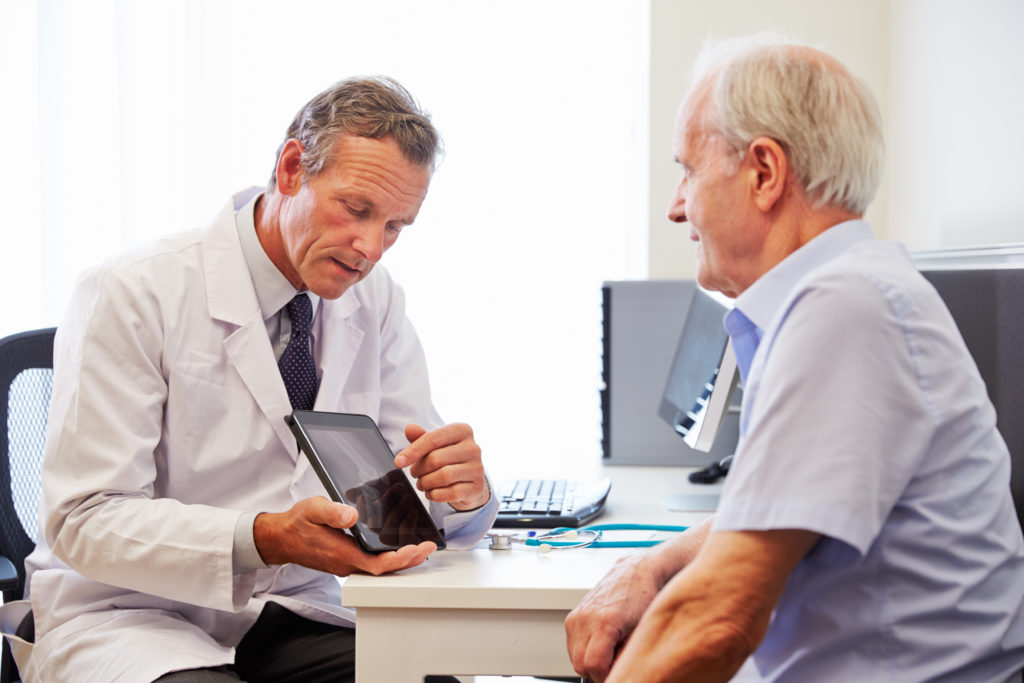Fill our form to download your free research report, written by Dr Mark Hawker.
GP or A&E – Who Do I Go And See?
During the winter months, both GP’s (General Practices) and Accident and Emergency departments are incredibly busy. With an increase in colds, flu’s and other illnesses, people are seeking medical attention in their masses.
Many of those affected tend to be the elderly or vulnerable who have both increased care and medical needs during the colder months. For example, those aged over 75 have a greater than 80% chance of needing admission to A&E, whereas, for the under 30, it is less than 20%.
A recent Primary Care Foundation report estimated that between 10-30% of all A&E visits “could be classified as primary care cases (types that are regularly seen in general practice)”, meaning they’re cases that GPs would be comfortable with even if they didn’t have any specialism in emergency medicine. With just over 23 million people visiting England’s A&E departments in 2016, that’s as many as 7 million people visiting A&E when they don’t need to.

People that don’t require emergency attention attending A&E’s can have a knock-on effect on emergency departments in a number of different ways, including:
- Increased A&E waiting times, which can be detrimental to those that require urgent care
- Staff shortages due to too many people needing care
- Staff tiredness and sickness due to overworking
So, if you’re feeling ill, who do you go and see? Your GP or A&E?
Your local General Practise and Accident and Emergency department are available to you if you are injured or ill, as well as other NHS services.
By choosing the right NHS service that best treats your symptoms you get better faster, as well as helping to reduce the pressure on local GP and A&E departments, allowing them to help those people in most need. Visit our ‘How to Keep the Elderly and Vulnerable Safe During Winter’ blog for more information on managing winter illnesses, and staying healthy during the winter months.
Is A&E the Right Place for me?
For those that require emergency care for serious and life-threatening conditions, A&E is the best place to go. It is, however, this means it is vital the service is used correctly in order to support the people that need it the most. People experiencing chest pain, blood loss or that may be blacking out or choking takes priority over minor ailments. Other reasons for visiting A&E include loss of consciousness, breathing difficulties, allergic reactions or severe burns or scalds.
If you consider yourself to be in need of urgent care but do not consider it an emergency you can visit an Urgent Care Centre. These centres treat most injuries and illnesses that are urgent but not life-threatening, including sprains and strains, broken bones, minor burns and scalds, minor head and eye injuries, bites and stings.
As A&E may not be the most appropriate place for you to come to seek medical advice and help, it’s worth looking at the other options available to you, including:
General Practice
If you’re experiencing an illness or injury that won’t budge, it may be best to make an appointment with your nearest GP. This could include illnesses such as persistent vomiting, earache, stomach ache or a backache. Visiting your local General Practice allows you to get the treatment you need at a convenient time and place, helping to reduce the demand for our emergency services and accident and emergency departments.
Registering for your local General Practice is completely free and means you can make appointments with a doctor for medical advice, examinations and new/repeat prescriptions.
If you need help finding your nearest GP you can use the online search on www.nhs.uk or call 0300 311 22 33.
NHS 111
If you believe you need medical attention quickly but would not consider it an emergency, there is the option to call the 111 NHS Free Phone service. This service operates 24 hours a day, 7 days a week, 365 days a year. All calls to this number are assessed and the appropriate advice is given. If needed, callers will be directed to their local health service that is the most appropriate to their situation.
It is advised you call 111 if:
- You need an urgent care service but it is not considered an emergency
- You don’t know who to call for medical help
- You need information about a particular health issue
If you consider it to be an emergency and think someone needs help to save their life, call 999 instead.
Pharmacist
If you are experiencing some discomfort but do not consider yourself to require emergency medical care, it may be best to visit your local pharmacist. They can give you expert advice about over the counter medicines that can help with lots of different common conditions including a runny nose, a headache, diarrhoea or a painful cough. As you do not need to make an appointment to see your local pharmacist, this is the quickest service to use for minor ailments.
If you need help finding your local pharmacist, use the online search on www.nhs.uk or call 0300 311 22 33.
Self-care
A lot of the time, common illnesses can easily be treated at home by using over-the-counter medicine alongside a few days of rest. It is always worth keeping a stock of paracetamol, aspirin, anti-diarrhea medicine, rehydration mixture, ibuprofen, indigestion remedies, plasters and a thermometer in your medicine cupboard, as you never know when they might come in handy. Self-care is often the best choice to treat minor illnesses and injuries, as it doesn’t affect the wait times at your GP or A&E department.
For more information on self-care, visit www.nhs.uk.
If in any doubt about any symptoms you are experiencing please contact a medical professional, whether it’s by calling 111 or visitng your GP.
- December 19, 2017
- Emergency Services









